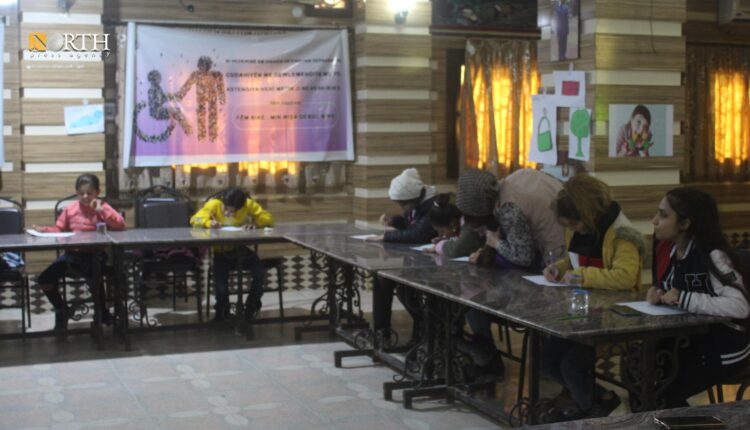
By Fattah Issa
KOBANI, Syria (North Press) – Thirty-five children with special needs (CWSN) gather every day for four hours in a hall in the city of Kobani, northern Syria, to learn various skills under the supervision of specialists from Kobani University and an organization dedicated to helping CWSN.
On November 13, Kobani University, in collaboration with Nudem, a non-governmental non-profit organization that works on rehabilitating CWSN, has initiated a 40-day training course for CWSN.
Mavalda Napoli, an Italian psychosocial support trainer and administrator at Nudem, says that the course includes various activities such as planting flowers and trees, which is dedicated to raise the children’s awareness about nature and environment.
“Deaf and mute children are being trained to improve their language skills. We also teach them about colors, as well as math and other educational skills,” she tells North Press.
The course includes cultural and artistic activities for children such as singing, dancing, traditional folk dances, and painting. These activities, she says, aim to help the children to express their feelings and develop their artistic skills and to share their emotions and thoughts with other people.
Teachers are also targeted
The course not only aims to help children but also seeks to educate teachers about children with special needs. Specifically, it aims to teach teachers that this category of children, especially those with motor disabilities, can pursue their education in public schools.
Napoli notes that the objective is to elevate the teacher’s teaching and training skills so they can help CWSN inside their classrooms and promote their integration into society.

During the training sessions, the children sit alongside each other, making new friendships, she adds.
Nesrin, a child with Down syndrome, participates in sports, physical and musical activities throughout the four-hour session every day.
Napoli believes the course provides an opportunity for children whose parents refrain from sending them to schools due to various difficulties; it allows them to learn new skills, fostering self-confidence, helping them to make friendships, and promoting integration within their community.
First Step
She states that CWSN worldwide need activities tailored for them, noting that such activities are unfortunately few. “This course, fortunately, is considered a first step.”
She hopes that the Kobani community will support CWSN in the future, adding that through knowledge-sharing and unified efforts, a lot of progress can be made for these children.
Napoli highlights the necessity of raising awareness, especially among families of CWSN, that this group can integrate into society.
She emphasizes that institutions such as universities and municipalities must heed to the needs of CWSN.
Napoli points out a notable progress observed in the children’s development over a two-week training period. This progress, she says, is particularly evident in the improvement of their communication skills, especially among children with Down syndrome and autism who previously faced challenges in interacting with their peers.
The trainer explains that children in these two categories often face bullying in the streets, which leads them to self-isolate themselves and avoid interacting with others.
“Most teachers face challenges in dealing with children with autism or Down syndrome, but through this course, they are being trained on how to do so,” Napoli said.
Activities, Skills
The training course includes conducting diverse activities and teaching sport, play, musical and speech skills, according to Dr. Muhammad Barho, Co-chair of the Faculty of Education at Kobani University.
“We hope to achieve positive results for these children by the end of the course,” he says, adding that the majority of the targeted group have improved in terms of pronunciation, linguistic, and motor skills over the past days.
He adds that three children with Down syndrome have significantly improved their skills.
The course targets children aged between 10 to 15, but there are younger children participating in the program.
“The objective of the training course is to develop communication skills and foster creativity for the targeted group. Furthermore, it aims at integrating them into society to enable them to work, and contribute to the local community,” Barho concluded.
